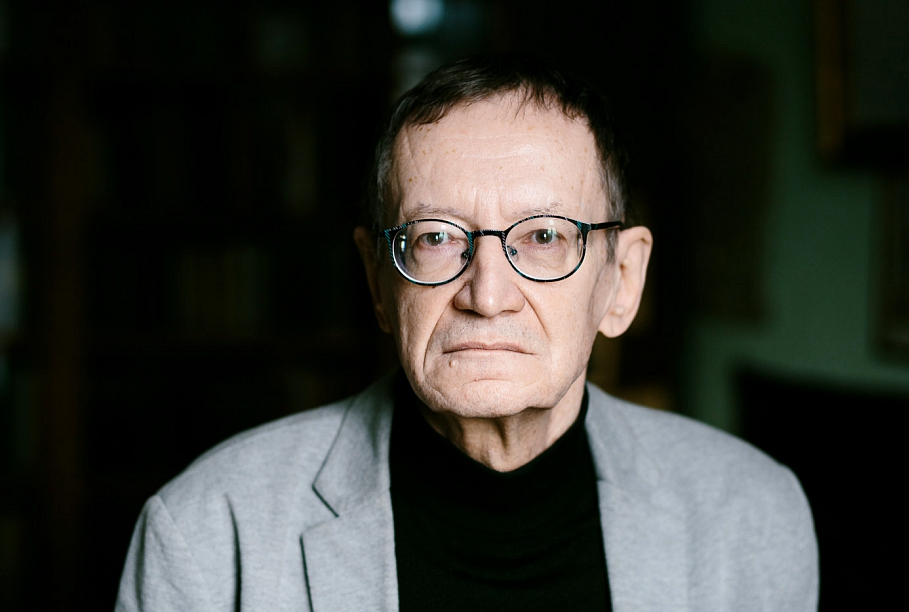Rokpelnis said he became a collaborator with the KGB in 1985.
Following the outcry over the removal of Jānis Škapars as editor-in-chief of the Literature and Art (Literatūra un Māksla) newspaper, KGB officer Juris Miļevskis inquired as to why so many people had rushed to Škapars' defense and so came in touch with Rokpelnis, an employee at the newspaper at the time.
"Miļevskis seemed to me to be a normal person, as opposed to all the reinforced-concrete faces that had interrogated me at the KGB these two times [previously]" the poet told the newspaper.
"One time, it was in the summer, Miļevskis.. told me, 'Listen, Jānis, could you help us? The higher-ups are railing against me as I can't find any assistant.' .. He gave me a file that said I swear not to expose the methods employed by the KGB. It was completely neutral, it didn't say I was to report things to them. And down the page was a space for my signature," he said.
He also said he was driven to become an informant as he wanted to expose the ways the KGB worked, however after he had signed the file given to him he was overcome by feelings of dread.
"Later [the notable poet and translator] Uldis Bērziņš asked me whether I had learned something about the structure of the KGB. I didn't learn anything... I signed the file [Miļevskis] gave me, left the room and at that same moment I realized that I had ruined my life. The KGB had all it needed to destroy me," he told the newspaper.
He had acted under the codename Miķelis and met Miļevskis at a secret hideout. Miļevskis had been interested in the plans of his colleagues.
"The only time they tried to use me was with the Estonian novelist Arvo Valton. They said, go to him, as the local KGB can't get to him. Get in touch with him. But I refused. Thankfully Miļevskis did not pressure me," said Rokpelnis.
"I did not betray anyone, and I did not work as a provocateur. I was an analyst, I helped the KGB understand the views of the intelligentsia," he said.
Rokpelnis said he had been offered premiums of 25 rubles and also smoked sausages, which he had refused.
After Miļevskis left the KGB two years later, Rokpelnis said, he had cut all ties to the KGB.
In the interview, he also said that, prior to becoming an informant, he had cursed the KGB and the communists during bouts of drinking. That had resulted in several interrogations at the infamous 'Corner house', or the KGB headquarters.
The revelation came as a shock to many, with the initial reaction being shock followed by sympathy for coming clean.
"Thank you for your confession. It does not diminish my respect against you as a poet or a person," said journalist Sanita Jemberga.
.@Rokpelnis Paldies, ka Jūs atzināties. Tas nemazina manu cieņu ne pret Jums kā dzejnieku, ne kā cilvēku. 2ajā gadījumā tā pat palielinās: par drosmi un attiecībām ar tīru sirdsapziņu.
— Sanita Jemberga (@jemberga) December 27, 2017
"You have my respect, Rokpelnis! It's proof that Latvia must have an organized lustration process," said poet Liāna Langa.
Jānis Rokpelnis: Es biju VDK aģents - https://t.co/C0k2qjvbKE via @nralv Visu cieņu @Rokpelnis! Pierādījums, ka LV jābūt organizētam lustrācijas procesam.
— liana_langa (@liana_langa) December 27, 2017
Meanwhile historian Kārlis Kangeris, head of a committee researching the KGB files in Latvia, said that out of 4,300 files researched by the archive, 583 have to do with culture employees.
The end of May, 2018 has been set as the time for opening the KGB archives to the public.
A popular assumption in society is that parts of the records are kept secret because they contain material that might embarrass influential individuals still enjoying a degree of prominence today.
Jānis Rokpelnis (1945) is known as one of the greatest poets of his generation. His poetry has been translated into English, French, Italian, Lithuanian and Russian.





























